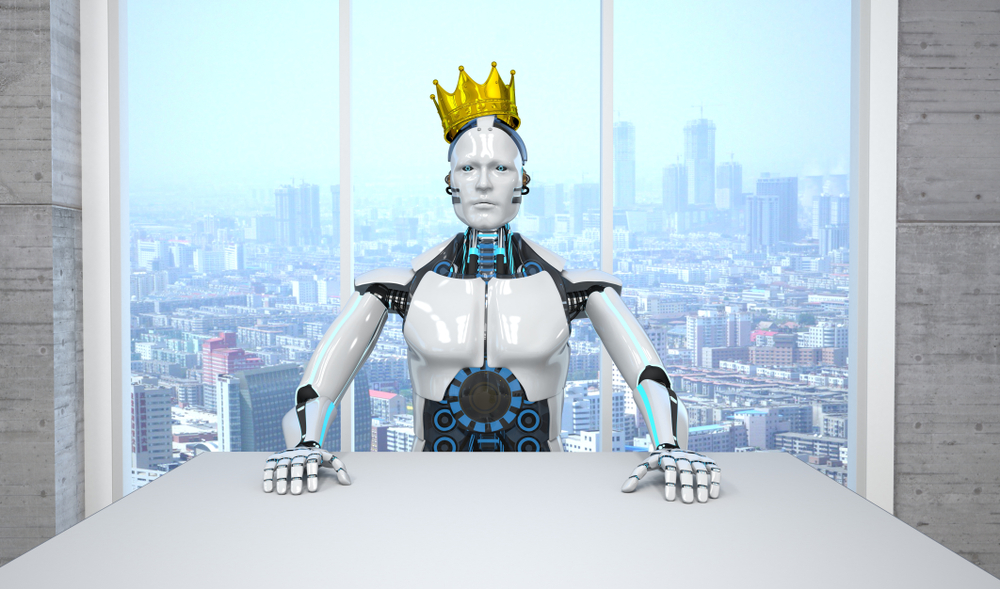Robotization can lead to dictatorship

The previous article on the topic of replacing a person with a robot received a large number of comments. It turns out that the topic is alive not only in our heads.
Since we ourselves contribute to robotization both in the context of education in our School and in the context of the projects we do, we involuntarily have to think about where the process can lead and how to avoid the associated threats.
In this publication, we decided to partly respond to comments from the previous article , partly to further develop the topic. If someone has not read the original publication - we suggest doing this, as well as comments to it.
So let's not temporarily argue about whether it will happen that robots can replace humans or not. It does not happen - approx. But, if that happens, then we see the following:
Robots are pushing out more and more human specialties and people from them. People in an attempt to survive and live normally move in four directions:
- some are developing in the direction of more and more intellectual and creative activities. Moreover, there may be intellectual and creative products that we cannot even imagine for ourselves now;
- others go to the sphere of services and trade, to that part of them where personal human contact is still important. However, one should understand that since the consumers of these services also need revenues, the mass character of the market itself is also reduced;
- still others are fleeing to countries and regions where the level of robotization is not yet very high and there is faced with high competition from other people of the same kind;
- a fourth actually do the most correct (for them) and the obvious - go into power. This can be both economic power (that is, the possession of the instruments of production, respectively, robots), and political power.
And, accordingly, these fourths, being in power and sharing it with very few others, understand that from 90% of people really do not depend at all, they do not represent not only physical strength, but also economic. Accordingly, they no longer need to be considered.
You can, of course, argue about the fact that there is (at least in some countries) a system of “checks and balances” in the structure of government that will not allow this to happen. However, let us remember that all these principles are in fact the result of the French Revolution and the revolutionary movements in general.
Accordingly, they proceed from the paradigm that if the majority of the people are dissatisfied, they will rebel and do as they need (this is, of course, simplified). And in order to avoid this, you need to build in the “voice of the people” in the very system of government (or make it appear like this embedding).
However, what if it doesn’t matter if the people rise up or not. Since its very presence is no longer mandatory. What will keep all these postulates of management?
Morality? That is, those who will have all the resources and tools of production (in fact, everything that is necessary to live, develop, etc.) will have to be so morally responsible to feed everyone else forever? It seems to me that this is a non-equilibrium system, and at some point it will balance and is clearly not in favor of all these others.
Someone in the comments suggested sharing the result of production among all. But already tried in history. No one is normal and long-term failed, and such attempts have always been associated with the emergence of dictatorship.
You can, in theory, do something different: to divide the rights to the instruments of production, that is, to robots. This means, for example, that everyone will have their own robot avatar, which he will send to work at the plant while he will lie in the sun in the Caribbean. Beautiful idea. The problem, from my point of view, is in the alienability of property and the concentration of power. Accordingly, such a system is also not an equilibrium and at some point the rights to robots will be redistributed.
We need the idea of an equilibrium system, that is, one where resources will be earned and not given voluntarily. That is, you need to come up with the value that the remaining people will generate beyond what can be done, raised or built.
Does something come to your mind? I have not yet. Not on a massive scale.
Another way is to greatly enhance the value of the person. That is, not what he creates or produces, but himself to do it to such a level that this value overlaps all material interests. So it is possible? Maybe it can. But I think you will agree that now society is not ready for this and it will take years, decades, centuries to make it ready.
Such thoughts while we have. What do you think?
And, as usual, you want to learn more about intelligent robots and how they are made - come to our course for analysts . We have greatly deepened the program in the direction of artificial intelligence.
The main part of machine learning (without fundamentals of nowhere) is accompanied by large blocks of convolutional and recurrent neural networks, computer vision, image generation, natural language understanding and dialogue systems.
